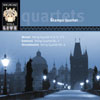Mozart; Smetana String Quartets
A stand-out performance shows the Skampa have Smetana in their blood
View record and artist detailsRecord and Artist Details
Composer or Director: Bedřich Smetana, Dmitri Shostakovich, Wolfgang Amadeus Mozart
Genre:
Chamber
Label: Wigmore Hall Live
Magazine Review Date: 1/2008
Media Format: CD or Download
Media Runtime: 63
Mastering:
Stereo
DDD
Catalogue Number: WHLIVE0019

Tracks:
| Composition | Artist Credit |
|---|---|
| String Quartet No. 21 |
Wolfgang Amadeus Mozart, Composer
Skampa Quartet Wolfgang Amadeus Mozart, Composer |
| String Quartet No. 2 |
Bedřich Smetana, Composer
Bedřich Smetana, Composer Skampa Quartet |
| String Quartet No. 8 |
Dmitri Shostakovich, Composer
Dmitri Shostakovich, Composer Skampa Quartet |
Author: David Fanning
Smetana’s pain-wracked D minor Quartet is here given the wiry intensity and urgency it obviously demands but too rarely receives, taken to the point of roughness but never pushed over the edge. Hear the third movement’s furious opening and its disruptive later stages, and see if it doesn’t make you sit up. All in all, a thoroughly involving experience – lived through in the preparation, lived out in the performance itself.
There cannot be too many concerts in which Shostakovich’s Eighth Quartet is upstaged by Smetana. But for all that the Skampa Quartet have obviously given much consideration to tone and attack, and the structure is certainly well paced, I do not get the feeling that the music is in their blood in the way that the Smetana is. Balance goes slightly awry in the middle of the first movement (a lack of support from the cello) and the non-vibrato approach to almost all the melodies is greatly overdone, smacking of experimentation in the rehearsal room rather than an ability to take the listener’s point of view.
The Mozart is the real problem child. Here the players adopt a quasi-period thinness of tone, and they certainly have true enough intonation to get away with it. But since their instruments are not otherwise set up in historic manner, there is an absence of the tonal allure that would make proper musical sense of such an approach; the results, in other words, merely sound under-nourished and constrained. Their best friends might also usefully have counselled against showing alternative approaches to the grace-notes for the main first movement theme on its structural repeat, since the effect is more like a demonstration in an academic lecture than a real performance.
The recording brings out a spartan quality in the Wigmore Hall acoustic: great for clarity, not so great for bloom.
There cannot be too many concerts in which Shostakovich’s Eighth Quartet is upstaged by Smetana. But for all that the Skampa Quartet have obviously given much consideration to tone and attack, and the structure is certainly well paced, I do not get the feeling that the music is in their blood in the way that the Smetana is. Balance goes slightly awry in the middle of the first movement (a lack of support from the cello) and the non-vibrato approach to almost all the melodies is greatly overdone, smacking of experimentation in the rehearsal room rather than an ability to take the listener’s point of view.
The Mozart is the real problem child. Here the players adopt a quasi-period thinness of tone, and they certainly have true enough intonation to get away with it. But since their instruments are not otherwise set up in historic manner, there is an absence of the tonal allure that would make proper musical sense of such an approach; the results, in other words, merely sound under-nourished and constrained. Their best friends might also usefully have counselled against showing alternative approaches to the grace-notes for the main first movement theme on its structural repeat, since the effect is more like a demonstration in an academic lecture than a real performance.
The recording brings out a spartan quality in the Wigmore Hall acoustic: great for clarity, not so great for bloom.
Discover the world's largest classical music catalogue with Presto Music.

Gramophone Digital Club
- Digital Edition
- Digital Archive
- Reviews Database
- Full website access
From £8.75 / month
Subscribe
Gramophone Full Club
- Print Edition
- Digital Edition
- Digital Archive
- Reviews Database
- Full website access
From £11.00 / month
Subscribe
If you are a library, university or other organisation that would be interested in an institutional subscription to Gramophone please click here for further information.




